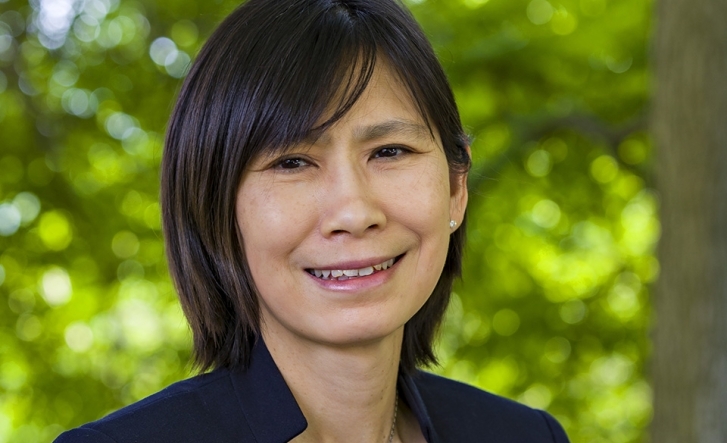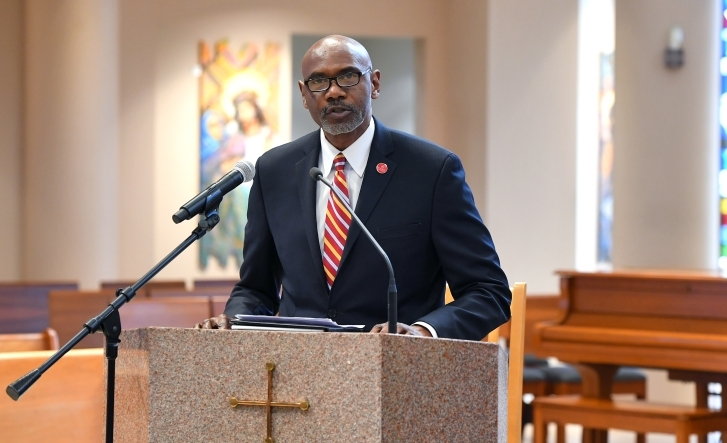Psychology Professor Recognized as Pioneer of Bilingual Training
An innovator and recognized leader in the field of assessment and evaluation of children who are culturally and linguistically diverse, Professor of Psychology Samuel O. Ortiz, Ph.D. is the 2019 recipient of the Trainers of School Psychologists (TSP) Outstanding Contributions to Training Award.

“But in my academic career, I’m helping more students at the same time, and then they go on to help more students; it’s a compounding effect over time. I’m fortunate to be at St. John’s where we have a bilingual track. We attract diverse students who go on to become bilingual school psychologists, and having a hand in their training extends into the practice they carry with them.”
An innovator and recognized leader in the field of assessment and evaluation of children who are culturally and linguistically diverse, Professor of Psychology Samuel O. Ortiz, Ph.D. is the 2019 recipient of the Trainers of School Psychologists (TSP) Outstanding Contributions to Training Award and the New York Association of School Psychologists (NYASP) Gil Trachtman Leadership in School Psychology Award.
TSP is the largest organization of school psychology trainers and is committed to innovation and excellence in graduate training programs for specialist and doctoral school psychologists. Each year, TSP presents an Outstanding Contributions to Training Award, which is given to a school psychology trainer who has demonstrated exceptional contributions to training throughout their career. Dr. Ortiz will be presented with this year’s award at the TSP Annual Conference on Tuesday, February 26, 2019, during the National Association of School Psychologists (NASP) Annual Convention in Atlanta, GA.
The NYASP Gil Trachtman award recognizes a school psychologist who has made a significant contribution to the field by virtue of teaching, research, or supervision.
“There are major unsolved problems in our field, including how we evaluate children who are culturally and linguistically different with tools that aren’t set up to do that properly,” said Dr. Ortiz. “What is a defensible way to evaluate English language learners and feel good about it? If a test involves language in any way, it’s going to be potentially biased. There’s very little training in this area and consequently, English language learners are disproportionately represented in special education. My work has allowed training programs to adopt a systematic framework for evaluation in order to meet some of the standards required for both fairness and accreditation.”
Both the Doctor of Psychology and Master of Science programs in School Psychology at St. John’s University offer a bilingual track. Students in that track develop the competency to evaluate individuals who aren’t native English speakers. They learn how to gather and interpret assessment data for English language learners while minimizing bias.
Before embarking on his academic career, Dr. Ortiz was a practicing school psychologist. “I realized that as a school psychologist, I was able to help one student at a time,” he said. “But in my academic career, I’m helping more students at the same time, and then they go on to help more students; it’s a compounding effect over time. I’m fortunate to be at St. John’s where we have a bilingual track. We attract diverse students who go on to become bilingual school psychologists, and having a hand in their training extends into the practice they carry with them.”
He has continued that compounding effect by training practitioners in the field and at other universities, as well as publishing work that has been adopted as a standard framework for evaluation of English language learners. For example, Dr. Ortiz has contributed chapters on non-discriminatory assessment to volumes four, five, and six of NASP’s Best Practices in School Psychology.
Dr. Ortiz came to St. John’s in 1999. He earned his Ph.D. in Clinical Psychology from the University of Southern California and completed postdoctoral training in Bilingual School Psychology at San Diego State University, where he also obtained certification as a school psychologist. From 1999-2000, he was a Visiting Professor and Research Fellow at Nagoya University in Japan, where he helped Japanese colleagues develop an infrastructure for school psychology training.
For Dr. Ortiz, who was born in the U.S. to Puerto Rican parents and grew up speaking Spanish, his time in Japan reminded him of the difficulties of learning another language. “Going to Japan gave me the opportunity to go through the process of learning language again, this time with the background of school psychology,” he said. “Even ordering dinner or going out anywhere was an ordeal, and I felt marginalized, isolated, and depressed. It reminded me that this is what people who are immigrants to the U.S. must feel.”
To advance the field of bilingual assessment, Dr. Ortiz has recently published the Ortiz Picture Vocabulary Acquisition Test (PVAT), a culmination of his scholarship and training. The Ortiz PVAT is a tool to evaluate children while controlling for factors related to differential language exposure and development that would otherwise contribute to biased assessment. The test makes it possible to evaluate an individual from any language background, determine whether their English vocabulary performance follows expected and normal developmental acquisition patterns (as either a native English speaker or an English learner), or rather, is suggestive of a true language problem or disorder. Dr. Ortiz hopes the PVAT becomes a standard in teaching methods of evaluation with multicultural and multilingual populations, bringing more cohesion to the field of assessment and bilingual school psychology. “If you don’t have standards, there’s no way to hold anyone accountable,” he said.
“I am honored to say that Dr. Ortiz was my mentor when I was in the Psy.D. program at St. John’s and I will always consider him as such,” said Marlene Sotelo-Dynega, ‘07Psy.D., graduate director for School Psychology. “It’s very hard to be in his presence and not be inspired to make this world a better, fairer place for those that we serve. The TSP Award is so very well deserved!”



